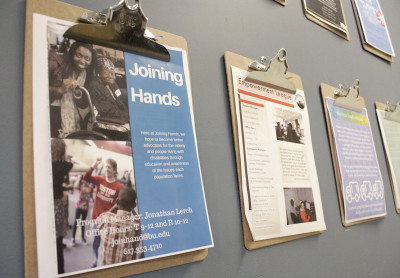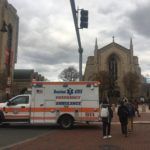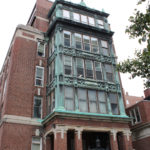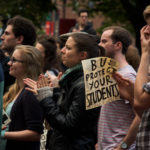
Many individuals make what activist groups consider the mistake of agreeing with seemingly harmless assumptions about those living with disabilities. Part of that comes from an unbalanced media portrayal, but what matters most to these groups are the steps to improve society’s overall perceptions of disability.
One supporter of this movement is Boston University’s Joining Hands, a program that links BU students with organizations that work with elders and people with varying abilities.
“I think people tend to brush [the elderly and those with different abilities] off as unimportant, not really useful,” said Jon Lerch, program manager at Joining Hands and a junior in the College of Arts and Sciences. “That’s totally wrong. You can learn so much from the elderly population and it really gives you a different perspective.”
Joining Hands is a program that runs through BU’s Community Service Center, located on the fourth floor of the George Sherman Union. The focus shifts each year depending on what the program manager wants to emphasize, Lerch said. However, the overall goal stays constant — to spread awareness of both populations and embrace differences.
There are various sites that volunteers can choose to visit, including opportunities to work with Special Olympics athletes, those working through memory loss and even horses.
There is usually a meeting at the beginning of each semester to encourage students to become a part of the Joining Hands family. Unfortunately, one of the biggest challenges, Lerch said, is recruiting passionate and dedicated volunteers. Students can volunteer in both the fall and spring semesters for two to three hours a week.
This semester, students can volunteer at three possible locations: Compass on the Bay, Newton Athletes Unlimited and the Strongwater Farm.
Compass on the Bay is a memory loss-focused facility that offers care for those who are struggling with issues like Alzheimer’s disease in the aging process. Volunteers who choose to go to Compass on the Bay often interact directly with the residents, Lerch said. At Newton Athletes Unlimited, volunteers walk and talk with Special Olympics athletes out on the track. This program provides recreational programs for individuals with disabilities.
“At our track program, a lot of [the athletes] are just walking at their own pace and they meet up with a volunteer and they start talking,” said Karen Peirce, associate director of special needs at Newton Athletes Unlimited. “It’s just these little connections that are very important to our athletes, but I also think they’re very important to the volunteers.”
The Strongwater Farm provides people with therapy through interacting with horses. Lerch said volunteers not only help maintain the barn, but also walk alongside riders, who are usually older individuals and those with disabilities.
“I would really stress how rewarding it is at each place,” Lerch said. “You really get that hands-on contact and the chance to develop relationships with people that way.”
Several other students at BU also said they find the direct service of Joining Hands appealing.
Doug Lappe, a senior in the Sargent College of Health and Rehabilitation Sciences, is in his second year of volunteering with Joining Hands, which he said he joined after discovering his passion for working with the differently abled as part of the First-Year Student Outreach Project’s Abilities team. From his point of view, Joining Hands has really benefited the community by bringing college students into an environment where people with disabilities can get the social interactions they need.
“For these people with disabilities, social interaction is something that can be incredibly challenging for them,” Lappe said. “Lack of social interaction can further stigmatize them away from full inclusion in society, which I hope for one day.”
Society’s perceptions of disability, though improved since the past, are still not completely perfect.
At one meeting this semester, Lerch showed a TED Talk to address this point. Stella Young, a comedian, journalist and disability advocate, shed light on the issue of people unknowingly belittling those who are disabled in order to benefit another. Someone is not “brave” or “strong” simply because they live in a wheelchair, Young said. It is simply all they know.
Joining Hands has worked to spread this message to BU students and the surrounding community. By directly connecting with two unique populations, Joining Hands has led students to begin treating the elderly and those with varying abilities with the respect and equality they deserve.
“It really helps open your eyes,” Lerch said. “Having these conversations and being with them … you can see that there really is no difference at all. They’re just as capable as anyone will let them be.”




